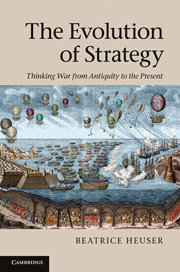Book contents
- Frontmatter
- Contents
- Acknowledgements
- A note on referencing
- Part I Introduction
- PART II Long-term constants
- PART III The Napoleonic paradigm and Total War
- PART IV Naval and maritime Strategy
- PART V Air Power and nuclear Strategy
- PART VI Asymmetric or ‘small’ wars
- PART VII The quest for new paradigms after the World Wars
- 17 Wars without victories, victories without peace
- 18 No end of history: the dialectic continues
- 19 Epilogue: Strategy-making versus bureaucratic politics
- 20 Summaries and conclusions
- Bibliography
- Index
17 - Wars without victories, victories without peace
from PART VII - The quest for new paradigms after the World Wars
Published online by Cambridge University Press: 05 June 2012
- Frontmatter
- Contents
- Acknowledgements
- A note on referencing
- Part I Introduction
- PART II Long-term constants
- PART III The Napoleonic paradigm and Total War
- PART IV Naval and maritime Strategy
- PART V Air Power and nuclear Strategy
- PART VI Asymmetric or ‘small’ wars
- PART VII The quest for new paradigms after the World Wars
- 17 Wars without victories, victories without peace
- 18 No end of history: the dialectic continues
- 19 Epilogue: Strategy-making versus bureaucratic politics
- 20 Summaries and conclusions
- Bibliography
- Index
Summary
[T]he field of battle is the only tribunal before which states plead their cause; but victory, by gaining the suit, does not decide in favour of the cause. Though the treaty of peace puts an end to the present war, it does not abolish a state of war (a state where continually new pretences for war are found).
(Immanuel Kant 1795/1796: 24)Indirect strategy seeks to obtain a result by methods other than military victory.
(General André Beaufre 1963/1965: 108)The First World War as turning point?
The major theme of this chapter does not start with Hiroshima in 1945. We could trace it back to Jaurès’s and August Bebel’s reactions to the Franco-Prussian War of 1870/1. But it is even more clearly present in reactions to the war of which contemporaries had ardently hoped that it would be ‘la der des ders’, the last of its kind, and which despite hecatombs of casualties failed to produce a lasting peace. As J.F.C. Fuller concluded from this experience, ‘[e]xacted peace can be no more than an armistice’ (Fuller 1961: 153). The strong perception of the futility of the sacrifices of that Great War by those who had fought in it and later witnessed Hitler’s attempts to reverse all its outcomes greatly influenced strategic thinkers.
Another line of thinking concludes from the ravages caused by war that little can be worth such destruction and misery. As wars mobilised entire nations whose populations were growing exponentially, and entire industrialised state economies, the degree of destruction grew in turn. Polish-born intellectual Jan Bloch (1899) thus argued that the cost of war and destruction for advanced societies was so high that few causes could warrant it. Yet the Great War soon showed that governments did not necessarily follow this logic.
- Type
- Chapter
- Information
- The Evolution of StrategyThinking War from Antiquity to the Present, pp. 441 - 471Publisher: Cambridge University PressPrint publication year: 2010

